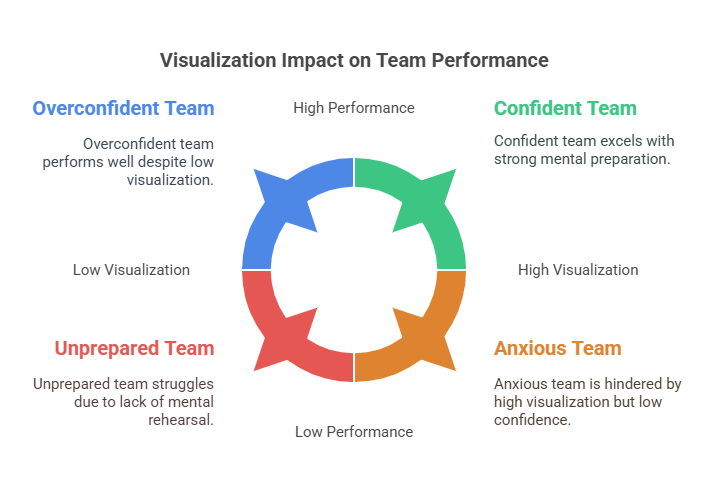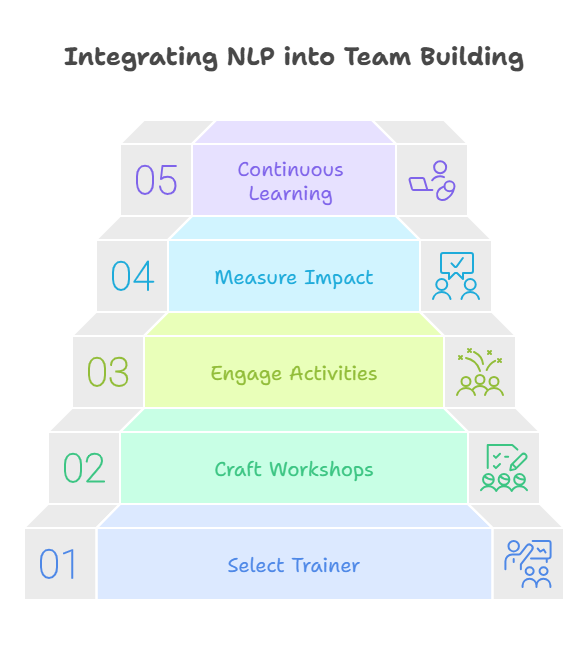In today’s fast-paced corporate team-building workshops using nlp world, effective teamwork is more important than ever. But building a cohesive team can be a challenge, especially when personalities, work styles, and communication habits vary. That’s where NLP (Neuro-Linguistic Programming) comes in. By tapping into the power of language and thought patterns, NLP helps teams communicate better, solve problems faster, and work more effectively together.
NLP isn’t just another corporate buzzword it’s a practical tool that can transform how teams interact. Whether you’re a manager looking to boost team performance or an HR professional planning your next team-building workshop, incorporating NLP can lead to lasting changes.
In this article, we’ll explore how NLP techniques can unlock your team’s full potential, improve collaboration, and create a more productive work environment. So, let’s dive into how NLP can take your team-building efforts to the next level!
What is NLP and Why Corporate Team-Building Workshops Using NLP?
NLP, or Neuro-Linguistic Programming, might sound complicated, but at its core, it’s about understanding how our thoughts, language, and behaviors are connected. It’s like learning the code behind our actions and using that knowledge to improve how we interact with others. Just like a team of athletes works better when they understand each other’s strengths, NLP helps teams understand each other’s communication styles and mindset.

At its heart, NLP is about change changing the way we think, communicate, and behave. By learning these techniques, teams can solve problems faster, work through conflicts smoothly, and align their goals. Whether it’s breaking old habits or building new, more effective ways of communicating, NLP offers the tools to make lasting changes in team dynamics.
So, why does it work for team-building? Think of a team as a puzzle. When every piece fits, the picture is clear, and things run smoothly. NLP helps each team member understand their role better, relate to others, and build stronger connections. It’s about improving communication, boosting motivation, and making sure everyone works toward the same goal. Simply put, NLP helps teams become more cohesive and productive by unlocking their full potential.
How NLP Enhances Communication Within Teams
Good communication is the foundation of every successful team. Without it, even the best teams can struggle. NLP helps improve communication by focusing on how we send and receive messages, both verbally and non-verbally. It’s like tuning an instrument each member of the team needs to play in harmony for the music to sound right.

Non-Verbal Communication and Rapport
A lot of communication happens without words. Body language, eye contact, and tone of voice can speak louder than any sentence. NLP teaches techniques like mirroring, where you subtly match someone’s body language or speech style. This builds rapport quickly and makes the other person feel understood. It’s similar to how we naturally bond with someone when they smile or gesture the same way we do. When teams connect on this level, trust and collaboration come more easily.
Active Listening with NLP Techniques
Listening isn’t just hearing words it’s about understanding what’s behind them. NLP emphasizes active listening, where you pay attention not just to the words, but to the emotions and intent behind them. It’s like reading between the lines. When team members practice this, they can truly understand each other’s point of view, reducing misunderstandings and building stronger relationships.
Overcoming Communication Barriers
Miscommunication can cause frustration and delays. NLP helps teams identify and overcome common communication barriers, like assumptions or negative language patterns. For example, by reframing a statement like “This project is too difficult” into “This project will challenge us to grow,” team members start approaching tasks with a more positive mindset. NLP provides tools to keep communication clear, open, and positive, helping teams stay focused and work efficiently.
NLP Techniques Used in Corporate Team-Building Workshops
NLP techniques are not just about theory they’re practical tools that can transform how a team works together. In team-building workshops, NLP exercises help people see things differently, communicate more clearly, and collaborate more effectively. Let’s take a look at some key NLP techniques used to enhance teamwork.

Anchoring Exercises to Boost Team Motivation
Imagine you’re about to face a tough task. What if you could instantly feel focused and motivated, just like a professional athlete before a big game? That’s what anchoring does. It’s a technique where you associate a positive emotional state with a specific action or gesture. In a team-building workshop, you can create a “motivation anchor” like clapping or taking a deep breath before starting a project. This triggers a confident, energized mindset, making it easier for teams to dive in and stay driven.
Reframing Exercises for Problem-Solving
Everyone has moments where challenges seem impossible. Reframing is about changing the way we view a situation. In a team-building setting, you might take a problem that feels overwhelming and help the team see it from a new angle. For example, instead of saying, “This is a roadblock,” a team might reframe it as “This is a challenge that will help us learn and grow.” This simple shift in perspective can help teams stay motivated and find creative solutions without getting stuck in negative thinking.
Visualization and Mental Rehearsal Techniques
Top athletes often use visualization to perform better. It’s the same for teams. In workshops, NLP uses visualization exercises to help teams mentally rehearse scenarios, such as solving problems together or hitting project milestones. By imagining success and seeing themselves overcoming obstacles, teams create a mental “blueprint” for success. When the real challenge comes, the team is more prepared to tackle it confidently and effectively.
Role-Playing for Effective Team Collaboration
Role-playing exercises help team members see things from other perspectives. Imagine a team dealing with a difficult customer or a conflict within the group. Through role-playing, each member can step into the shoes of others and experience the situation firsthand. This builds empathy, improves communication, and allows team members to practice solutions in a safe environment. With NLP, these exercises are designed to bring out the best in everyone, helping teams learn to work together even during tough times.
Benefits of NLP-Based Team-Building Workshops
NLP-based team-building workshops bring a lot of value to teams, enhancing communication, problem-solving, and overall performance. Here are five key benefits that teams can experience from these workshops:
Improved Team Collaboration
When a team communicates better, they collaborate better. NLP helps team members understand each other’s communication styles and triggers, leading to smoother interactions. With stronger rapport and mutual understanding, teams can solve problems more quickly and work more harmoniously, no matter the challenge.
Enhanced Conflict Resolution Skills
Every team faces disagreements. But it’s how teams handle them that makes the difference. NLP techniques like reframing and anchoring help team members move past personal differences and focus on the solution. This makes conflicts easier to manage, turning potential setbacks into opportunities for growth and better teamwork.
Increased Motivation and Engagement
When people feel heard and understood, they are more likely to be motivated. NLP teaches teams how to build a positive, supportive atmosphere where every member feels valued. This boosts overall team engagement, helping individuals stay focused and motivated to achieve common goals.
Better Leadership and Management Skills
Effective leadership is about more than just telling people what to do. It’s about understanding and guiding your team. NLP helps leaders tap into their team’s strengths and weaknesses, enabling them to manage more effectively. Leaders can use NLP to inspire their teams, communicate more clearly, and handle tough situations with confidence.
Stronger Emotional Intelligence
Emotional intelligence is essential for effective teamwork. NLP enhances self-awareness and empathy, which are key components of emotional intelligence. By using NLP techniques, team members can better understand their own emotions and those of their colleagues, leading to stronger relationships and a more supportive work environment.
How to Integrate NLP into Corporate Team-Building Workshops
Integrating NLP into your corporate team-building workshops isn’t a one-size-fits-all approach. It’s about making sure the techniques match your team’s needs and goals. Here’s how you can seamlessly bring NLP into your team-building activities for better communication, collaboration, and performance.

Selecting the Right NLP Practitioner or Trainer
The first step is finding the right NLP trainer who understands your team’s dynamics. You want someone who can guide your group through exercises that will actually make a difference, not just theory. Look for trainers who have experience with corporate settings and can adapt the techniques to fit your team’s unique challenges. Ask potential trainers about their previous work and how they customize workshops to achieve specific outcomes, whether it’s better communication or enhanced conflict resolution.
Crafting NLP Workshops Based on Team Needs
Before you dive into NLP, take time to assess your team’s current challenges. Are they struggling with communication? Do they need better motivation? NLP exercises are most effective when they’re built around the team’s specific goals. For instance, if your team often struggles with conflict, focus on reframing and anchoring exercises. If you want to boost motivation, consider using visualization techniques. By aligning the NLP techniques with your team’s goals, you ensure the workshop is as impactful as possible.
Designing Engaging and Interactive Activities
NLP is all about engaging the mind and emotions. The best way to integrate NLP into a workshop is through hands-on, interactive exercises. Activities like role-playing, visualization, and group discussions keep everyone involved and allow team members to practice NLP techniques in real-time. These exercises don’t just teach new skills they create shared experiences that help teams bond and build trust.
Measuring Success and Impact
Once the workshop is over, it’s important to measure how well the NLP techniques worked. Did communication improve? Are team members more motivated and engaged? Use feedback forms, surveys, and direct observation to assess changes in team dynamics. This allows you to see what worked and what needs adjusting. Regular check-ins and follow-up sessions also help ensure that NLP principles are being applied in day-to-day activities, not just during the workshop.
Creating a Continuous Learning Environment
NLP is most effective when it’s not just a one-time event. To truly integrate NLP into your team, create a culture of ongoing learning. Incorporate NLP exercises into team meetings, performance reviews, and daily interactions. The more your team practices these techniques, the more natural they will become. By embedding NLP into your company’s culture, you ensure long-term success and improvement in teamwork.
Common Challenges and How to Overcome Them in NLP Workshops
While NLP can bring great benefits to team-building, it’s not without its challenges. Some team members might be skeptical, or there may be resistance to trying new techniques. Here’s a look at common issues and how to handle them.
Resistance to Change
It’s natural for people to feel uncertain when asked to step out of their comfort zones. Some team members might resist participating, especially if they’re skeptical about NLP. To overcome this, focus on building trust. Start with simple, non-threatening exercises and show how NLP can have a real impact on their work life. Share success stories and give team members time to ask questions. The key is to make the process feel safe and supportive, not forced.
Diverse Team Dynamics
In any team, people bring different backgrounds, personalities, and communication styles. Some team members might be more open to NLP, while others may struggle with the concepts. To handle this, make sure to pace the workshops according to the needs of your group. Use a variety of exercises to engage everyone. Allow some flexibility and provide space for individual learning styles. The goal is to ensure everyone feels included, regardless of their starting point.
Short-Term Mindset
One common challenge with any team-building workshop is the belief that changes will happen immediately. NLP techniques, like any skill, take time to develop. To combat this, make the workshop an ongoing process rather than a one-time event. Encourage regular follow-ups and practice sessions to reinforce the skills learned. This ensures that the NLP techniques become a natural part of how the team communicates and works together.
Difficulty in Applying NLP Techniques
NLP techniques can be powerful, but sometimes team members may struggle with applying them to real-world situations. To help with this, use real-life examples during the workshop. Walk the team through situations where they can use the techniques, like reframing a challenging project or anchoring positive emotions before a presentation. The more hands-on the exercises, the easier it will be for everyone to see how NLP can be applied in their daily work.
Lack of Immediate Results
Team-building is an ongoing process, and results might not be obvious right away. If a team doesn’t immediately see improvements in communication or collaboration, they might lose motivation. To address this, emphasize the small wins. Celebrate progress, no matter how small, and remind the team that change takes time. Consistent practice and support will eventually lead to noticeable results, even if they’re gradual.
Conclusion
NLP-based team-building workshops can be a game changer for improving communication, collaboration, and performance within teams. By using NLP techniques like anchoring, reframing, and visualization, businesses can foster stronger leadership, enhance motivation, and resolve conflicts more effectively. Although challenges such as resistance to change or diverse team dynamics may arise, with the right approach, these hurdles can be overcome to ensure long-term success.
By integrating NLP into your team-building efforts, you’re not just improving the way your team communicates; you’re unlocking the full potential of each member and helping them work together more cohesively. With the right tools and a commitment to continuous improvement, NLP can lead to a more productive and positive work environment, driving both individual and team success. So, take the next step incorporate NLP techniques into your team-building strategies and watch your team flourish.





